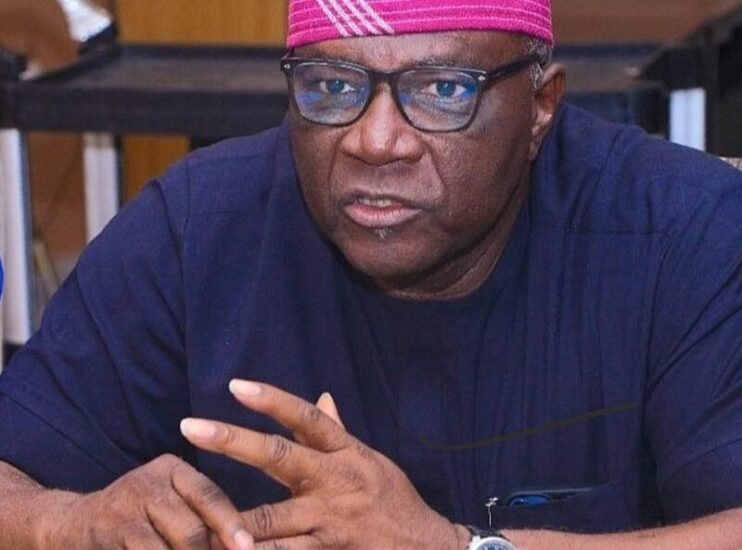Business
Trend Micro reveals new cybercriminal tactics, prevents attacks of Nigerian businesses

Trend Micro reveals new cybercriminal tactics, prevents attacks of Nigerian businesses
Trend Micro Incorporated, a global cybersecurity leader, has blocked over 10 million email threats, 800,000 malicious URLs and almost 4,500 dangerous mobile apps targeted at Nigerian businesses and consumers between January and June 2023.
This comes at a time the complexity of the country’s cybersecurity threat landscape continues to intensify.
These findings are brought to life by the Trend Micro 2023 Midyear Cybersecurity Threat Report, which presents highlights from the company’s telemetry, covering the broadest attack surface view across millions of commercial and consumer clients.
The report also uncovers key trends in criminal techniques, tactics and threat actor activity, providing important guidance for defenders looking to stay one step ahead of calculating cyber criminals.
“With each passing month, the local threat landscape becomes more intricate and convoluted.
“Our latest research shows that illegal actors are shifting targets and getting increasingly creative to become more efficient and prolific.
“Prioritising a set of proactive and holistic security solutions has never been more important,” says Gareth Redelinghuys, Country Managing Director, African Cluster at Trend Micro.
Ransomware groups are collaborating on ever shifting targets.
During the first half of 2023, around 2.4 million malware families were blocked by Trend Micro in Nigeria.
Ransomware, in particular, is a challenge for local companies, with hundreds of ransomware detections in June alone.
However, the Midyear Report offers valuable insight into the ways in which ransomware groups are operating – not only updating their tools and techniques to extract data more efficiently, but also adapting their business models.
Earlier this year, Trend Micro researchers discovered a new ransomware that uses legitimate search engine tools to search for files to encrypt.
Investigation into this new ransomware, which researchers named ‘Mimic’, suggests a connection with the larger and more notorious Conti ransomware group.
It is suspected that collaboration between these criminal groups helps them lower costs and increase their market presence while also maintaining the efficacy of their criminal activities.
According to the report, many ransomware players are also turning their data exfiltration efforts toward tactics such as cryptocurrency theft and business email compromise (BEC).
AI making hackers more productive
Another key trend that emerged in the first half of 2023 was the use of AI by cybercriminals to carry out virtual crimes more efficiently.
A significant number of Nigerian businesses have implemented AI in some form in a bid to elevate their operations – but they are not the only ones.
Recently, malicious actors have abused AI technology to accurately impersonate real people as part of their attacks and scams.
In fact, imposter scams such as virtual kidnapping are becoming increasingly rampant globally.
In the case of virtual kidnapping, malicious actors are able to create a deepfake voice of their victim’s child and use it as proof that they have the child in their possession to pressure the victim into sending large ransom amounts.
At the same time, ChatGPT and other AI tools are enabling criminals to automate the gathering of information, formation of target groups, and identification of vulnerable behaviours.
This is helping them lure big-name victims (also known as “big fish”) in harpoon whaling attacks.
Whaling involves tricking executives and directors through phishing campaigns for the purpose of stealing information or siphoning large sums of money.
Harpoon whaling, on the other hand involves extensive research on targeted individuals.
This attack is a highly targeted social engineering scam that involves emails crafted with a sense of urgency and that contain personalised information about the targeted executive or director.
With AI tools becoming increasingly adept at creating text that can seem human-crafted, the effort needed to attack executives has been drastically reduced, making the targeting of hundreds of thousands of executives easier than ever before.
Threat actors are innovating, finding new ways to target victims
As innovations continue to evolve and involve more data, threat actors have also been finding more ways to victimise people.
For example, today’s connected cars contain over 100 million lines of code, giving smart functionality to the user but also opening doors to hackers.
As more smart cars saturate the market, attackers will try to gain access to user account data and leverage it for crimes.
By hijacking or stealing such an account via phishing for credentials or installing malware, a cybercriminal could locate the car, break into it and potentially sell it on for parts or follow-on crimes.
They might even be able to locate the owner’s home address and target it for burglary when they are not in.
Threat actors have also been casting a wider net by leveraging vulnerabilities in smaller platforms for more specific targets, such as file transfer service MOVEit, business communications software 3CX, and print management software solution PaperCut.
“The increasingly sophisticated tactics being employed by hackers present a particular concern for local businesses which face untold potential damages at the hands of these malicious actors,” says Zaheer Ebrahim, Solutions Architect, Middle East and Africa at Trend Micro.
“It’s critical for defenders to gain a thorough understanding of the potential risks they are facing.
Knowing these threats will help them make more informed decisions and ultimately take proactive measures to stay ahead in the increasingly convoluted cat and mouse game of cybersecurity.”
Auto
Appeal court takes over NURTW case as NIC withdraws

Appeal court takes over NURTW case as NIC withdraws
The National Industrial Court has withdrawn from a case involving Alhaji Najeem Usman Yasin, Board of Trustees chairman of the National Union of Road Transport Workers (NURTW), and Alhaji Tajudeen Ibikunle Baruwa’s ambition to return as president of the union over lack of jurisdiction.
The industrial court’s decision was made to avoid conflict with the Court of Appeal, where the matter is already being heard.
Before the NIC announced its decision to hands-off the case, the defendants’ counsel, Mr. O.I. Olorundare SAN, had informed the court that the matter is currently before the Court of Appeal, Abuja division, and that the industrial court could not continue to adjudicate on the same matter.
The counsel cited authorities to support his claim, adding that the National Industrial Court does not have concurrent jurisdiction with the Court of Appeal.
The presiding judge, O.O. Oyewunmi, struck out the case, stating that the Appeal Court had taken over the matter and that the Industrial Court must respect the hierarchy of courts.
Alhaji Yasin and six others took the case to the Appeal Court, challenging the decision of the industrial court recognising a delegates’ conference held on May 24, 2023, where Baruwa was proclaimed as President of the union for a second term in office.
With the latest NIC judgement, both parties will now proceed to defend their positions at the Court of Appeal and await the final judgement.
Business
Multichoice shuns court order, proceeds with increase of DSTV, Gotv packages

Multichoice shuns court order, proceeds with increase of DSTV, Gotv packages
Despite the intervention of the CCPT, Multichoice Limited has proceeded to increase packages price for DSTV and GOTV as announce on Wednesday last week.
Newstrends had earlier reported that the corporation announced that the new rates will go into effect on Wednesday, May 1, 2024, in a statement.
Meanwhile, on Monday, MultiChoice Nigeria Limited was ordered by the Competition and Consumer Protection Tribunal (CCPT) in Abuja to suspend the planned prices and tariffs hike on packages and services.
READ ALSO:
- Ogun frees 49 inmates to decongest prisons
- JAMB, NCC in talks to produce special SIM for students
- Labour-FG face-off imminent as NLC rejects new salary increase
The three-member tribunal, presided over by Saratu Shafii, gave the interim order following an ex-parte motion moved by Ejiro Awaritoma, counsel for the applicant, Festus Onifade.
News prices includes: DStv, Premium bouquet, the price moved from N29,500 to N37,000; Compact+ from N19,800 to N25,000; Compact from N12,500 to N15,700; Confam from N7,400 to N9,300, among others.
For GOtv users, Supa+ increased from N12,500 to N15,700; Supa moved from N7,600 to N9,600; Max from N5,700 to N7,200; Jolli, from N3,950 to N4,850, among others.
Multichoice shuns court order, proceeds with increase of DSTV, Gotv packages
Business
As controversy over Maersk-FG port investment rages, Onanuga says no $600m deal signed

As controversy over Maersk-FG port investment rages, Onanuga says no $600m deal signed

The Nigerian government and a shipping giant, Maersk, have not signed any investment agreement, Bayo Onanuga, special adviser on information and strategy to President Bola Tinubu, has said.
Onanuga was reacting to the controversy surrounding the reported sealing of a $600 million deal for the development of the nation’s seaports.
He said there was only talk “of possible investment in Nigeria” by Maersk.
Interestingly Onanuga had hinted about the deal in a tweet said to have been pulled down after the social media backlash.
After President Tinubu’s discussion with Maersk’s Chairman Robert Uggla on April 28, on the sidelines of the World Economic Forum Special Meeting in Riyadh, Saudi Arabia, the presidency had released a statement announcing that the shipping company had pledged to inject $600 million into the Nigerian seaport industry.
“Danish shipping company, A.P Moller-Maersk plans $600m investment in Nigeria. Danish shipping and logistics company A.P Moller-Maersk has disclosed a planned investment of $600 million in Nigeria to accommodate more container shipping services in Nigerian ports,” Onanuga wrote on X.
In a statement, Tinubu’s spokesperson, Ajuri Ngelale, also said “President Tinubu meets Chairman of Danish shipping giant Maersk, secures $600 million investment in Nigerian seaport infrastructure.” He quoted Uggla as saying, “We believe in Nigeria, and we will invest $600m in existing facilities and make the ports accommodating for bigger ships.”
In response to this. Maersk officials have denied any such agreement and stress no deals have been signed.
Onanuga in a new report by TheCable, an online news platform admitted no agreement on investment had been reached by the two parties.
“I think the statement issued by Maersk did not talk about a deal. There was no deal according to that statement that I read.
“However, there was talk of investment,” the special adviser said.
“No document or agreement was signed, so there was no deal. But there was talk of a possible investment in the country.
“So, go and read the statement again. They never said any deal was signed between the Nigerian government and the Dutch company. There was nothing like that.”
Onanuga however said the shipping company did not expressly deny that there was an investment talk.
He said people are “unnecessarily giddy over nothing.
-

 metro2 days ago
metro2 days agoLabour Day: Nigerian workers are dedicated, resilient, says NURTW leader
-

 Auto1 day ago
Auto1 day agoAppeal court takes over NURTW case as NIC withdraws
-

 News2 days ago
News2 days agoFG approves salary increase for civil servants, military, police
-

 News1 day ago
News1 day agoLabour-FG face-off imminent as NLC rejects new salary increase
-

 International2 days ago
International2 days agoBinance founder bags jail term in US
-

 metro3 days ago
metro3 days agoWoman arrested in Ogun after husband commits suicide
-

 metro15 hours ago
metro15 hours agoSecurity forces, vigilantes arrest kidnapper terrorising communities in Kogi
-

 News2 days ago
News2 days agoFG set to repatriate 20,000 Nigerians from Chad, Cameroon






















